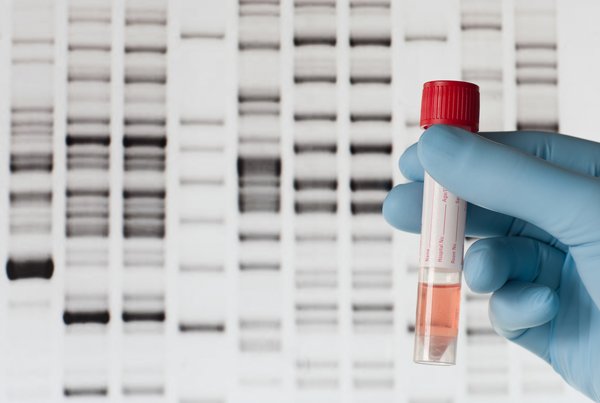Genomics is the study of genes and their functions. With technology advancements dramatically improving the cost, accuracy, and time to map a person’s entire genome, many rapidly growing companies are emerging in the genomics sector.
Innovation investors, such as Cathie Wood of Ark Investment Management, believe these advances are creating a "Genomic Revolution." Although there have been positive developments from many genomic companies in recent years, that hasn't always led to financial rewards for investors. From 2020 through 2024, the S&P Biotechnology Select Industry Index decreased in value.

Going forward, investors can look to better returns from genomics companies in three broad categories:
- Genetic sequencing and analysis: Sequencing companies are the engines of genetic research. Sequencing is the process of reading the 3.05 billion base pair sequences and looking for variants (sometimes called defects) where the sequence is missing or different from normal. Sequencing underpins genomic research and is a critical component of genetic testing. Technology advancements have decreased sequencing costs from $1 million in 2007 to just $600 in 2024. The overall sequencing market is projected to grow to $51.3 billion by 2034.
- Genetic testing and diagnostics: Testing and diagnostic companies use sequencing data to identify specific genetic variations and map them to known conditions. This can provide early detection of potential diseases for a head start in prevention or treatment. The market for genetic testing services is expected to reach $91.3 billion by 2034.
- Genetic editing: The promise of gene editing is that it acts like molecular scissors by targeting a specific variant in the DNA, slicing it out by cutting the nucleotides holding the defect in place, and then filling in the gap. Gene-editing companies have the potential to treat and even cure diseases caused by genetic variants. The gene-editing market is projected to reach $40.5 billion by 2033.
Best genomics stocks of 2025
Best genomics stocks of 2025
| Genomics Company | Market Capitalization | Description |
|---|---|---|
| Illumina (NASDAQ:ILMN) | $21.7 billion | Industry leader in DNA short-read sequencing technology. |
| Avidity Biosciences (NASDAQ:RNA) | $3.5 billion | Targeted RNA therapies to treat rare muscular diseases. |
| Exact Sciences (NASDAQ:EXAS) | $9.6 billion | Cancer testing for consumers and healthcare providers. |
| Fulgent Genetics (NASDAQ:FLGT) | $523.0 million | Genetic testing for cancer, infectious disease, rare disease, and reproductive health. |
| Ionis Pharmaceuticals (NASDAQ:IONS) | $5.0 billion | Biotech company developing RNA medicine to treat serious diseases. |
| CRISPR Therapeutics (NASDAQ:CRSP) | $6.9 billion | CRISPR gene editing for targeting multiple diseases. |
1. Illumina
1. Illumina
Illumina (ILMN -1.38%) is the industry leader in using short-read sequencing technology, which breaks DNA into short segments to aid in analysis for genetic research, testing, and medical treatment. With an installed base of more than 25,000 sequencing systems, Illumina holds around 80% of the global market.
Sequencing volumes continue to grow in research and are growing rapidly in clinical applications, with the key drivers including whole-genome sequencing, cancer testing, and recurrence monitoring. Illumina's recent focus has been growing customer adoption of its NovaSeq X platform. Released in January 2023, this sequencer improves turnaround times and simplifies data analysis.
Financial numbers for Illumina have been in line with expectations recently. It reported $2.7 billion in revenue for the first three quarters of 2024, a 5.1% decrease from 2023.
2. Avidity Biosciences
2. Avidity Biosciences
Avidity Biosciences (RNA -3.52%) develops targeted RNA therapeutics. It specializes in antibody oligonucleotide conjugates (AOCs), which are able to deliver to previously inaccessible tissues and cell types and target genetic drivers of disease.
This company has clinical development programs for three rare muscle diseases. Its lead candidate is Del-desiran (AOC 1001), a treatment for the muscle-wasting disorder myotonic dystrophy type 1. It’s also developing del-brax (AOC 1020), a treatment for facioscapulohumeral muscular dystrophy (FSHD), and del-zota (AOC 1044), a treatment for people living with Duchenne muscular dystrophy amenable to exon 44 (DMD44).
Investors flocked to Avidity Biosciences in 2024 as it reported positive data from its clinical trials. Since it’s in the development stage, it isn’t profitable yet, with net losses of $220 million over the first three quarters of 2024.
3. Exact Sciences
3. Exact Sciences
Exact Sciences (EXAS -3.37%) developed the Cologuard home test for colon cancer as an alternative to colonoscopies. The company also acquired Genomic Health in 2019, bringing the Oncotype DX cancer diagnostics platform into its product lineup.
After a strong 2024, Exact Sciences is on the road to profitability, which is no small feat in the genomics market. Projected full-year revenues are $2.8 billion, a 10% year-over-year increase. It’s expected to be net income-positive in 2026.
Cologuard has been a big revenue driver for this company. It accounts for 98% of $2.1 billion in expected screening revenue. Going forward, Exact Sciences is launching Oncodetect, a molecular residual disease test, and Cancerguard, a multi-cancer screening test.
4. Fulgent Genetics
4. Fulgent Genetics
Fulgent Testing (FLGT -3.93%) is a genetic testing company offering more than 18,000 tests. These include cancer tests, screening for rare diseases, and genetic tests for newborns.
Because of all the tests this company offers, it has become the go-to option for many doctors. That has helped it establish a robust and growing core business.
Its core revenue, which doesn’t include revenue from COVID-19 testing products and services, grew by 9% year-over-year to $71.7 million in the third quarter of 2024. Core revenue for the full year is expected to total $280 million. Fulgent Testing is also conducting clinical trials of a treatment for head and neck cancer.
5. Ionis Pharmaceuticals
5. Ionis Pharmaceuticals
Ionis Pharmaceuticals (IONS -0.25%) develops RNA-targeted medicine to treat serious diseases. Along with Biogen (BIIB -1.49%), it developed Qalsody, the first medicine for the genetic cause of amyotrophic lateral sclerosis (ALS). The FDA approved Qalsody in April 2023.
The company’s flagship product and biggest revenue driver is Spinraza, a prescription medication to treat spinal muscular atrophy (SMA). Spinraza royalties accounted for $57 million in revenue in the third quarter of 2024, out of a total of $134 million in total revenue, beating analyst expectations.
Ionis took a net loss of $148 million for the quarter, and $364 million over the first three quarters of 2024. To improve its financial security, it used an equity offering to increase its cash reserves to $2.5 billion. While it hasn’t been profitable so far, Ionis has several promising products in its drug pipeline and partnerships with large pharmaceutical companies.
6. CRISPR Therapeutics
6. CRISPR Therapeutics
CRISPR Therapeutics (CRSP -3.08%) and its partner, Vertex Pharmaceuticals (VRTX -2.87%), developed Casgevy (exagamglogene autotemcel), a gene therapy for treating sickle cell disease and beta-thalassemia. It’s the first FDA-approved treatment to use a type of novel gene editing technology.
Casgevy is still in the early stages of its rollout, but there’s high demand for it so far. CRISPR is also developing therapies for oncology and autoimmune diseases, as well as cardiovascular indications.
CRISPR isn’t profitable yet -- it reported net losses of $328.9 million over the first three quarters of 2024. However, it has a strong balance sheet with about $1.9 billion in cash reserves at the beginning of 2025.
Related investing topics
Investing in genomics stocks
Investing in genomics stocks
Some investors find genomics companies complicated. That’s understandable when many are founded by serious researchers and even Nobel Prize winners. Other investors find them too volatile, particularly gene-editing stocks with prices often in a lull for long periods, then moving strongly up or down in a single day, depending on the outcome of clinical trials.
From a higher-level perspective, genomics companies can look like the technology companies many investors love. Sequencing companies can be compared to companies such as Alphabet (GOOGL -1.85%) (GOOG -1.92%) that are organizing and analyzing voluminous amounts of data. Testing companies can be compared to e-commerce companies such as Zillow Group (ZG -2.62%) (Z -2.5%) that are helping consumers get the information they need to make informed decisions. Gene-editing companies can be compared to a pre-revenue special purpose acquisition company (SPAC), such as Virgin Galactic (SPCE -1.17%), that goes public before it has a working product.
The rapid growth expected in the genomic segments means there will be many winners. Investors can start by picking a company from the segment they find most attractive. Alternatively, investors can consider a basket strategy of putting money into several companies and watching them closely over several years.
For patient buy-and-hold investors, genomics could be good therapy for your portfolio.











